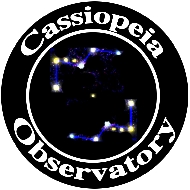 |
Last updated: 4 November 2010 |
|
|
Subject: Jupiter 31 October ETX-90 Sent: Tuesday, November 2, 2010 03:35:57 From: Maurice Collins (mauricejscollins@hotmail.com) Here is Jupiter on Oct 31 at 0820UT with the ETX-90 and 2xbarlow. I have enlarged it from the original image by about 1.5x.Here is Jupiter from tonight, Nov 2 with the ETX-90 and 2x barlow. The image is enlarged 150% from the original. The GRS is rotating into view in this the last shot I took tonight at 0815UT (9:15pm local).
Seeing A-III average, not good. Telescope: Meade ETX-90/RA Camera: Meade LPI at 0.25 sec exposure and contrast manual and set to white clip outside the histogram at around 140 approx. Capture software: Envisage software that comes with camera. 2xbarlow. Gain: 47, Offset: 45 438 jpg images stacked out of 480 captured in Registax 5 Regsitax Wavelet processing numbers: 1: 34.8 2: 43.7 3: 54.5 4: 50.7 5: 21.6 6: 41.2 Processed in Photoshop CS4 by increasing the size in 10% increments to 150%, turning to Lab color and doing a smart sharpen on the lightness at 20%, 1.1 pixels. Flipping image horizontal to take out the mirror diagonal. Adjusting the brightness with curves slightly. Hope that helps. The seeing was not good, so it would be good to see one when we have a steady night. For the Oct 31 image, the numbers should be the same as I use a saved setting file for Registax. I have reprocessed it in registax and the number of frames was 425 stacked out of 492 captured as Jupiter drifted off screen.
Subject: Meade LPI astro Imager Sent: Thursday, October 21, 2010 08:04:35 From: Ted Bade (tedbade@cox.net) Several years ago I purchased a Meade LDX75 Telescope, which came with the LPI camera, which I was never able to use, since I am a long time Mac fan and user. I was very happy to find your web area which discusses getting this cam to work native on the Mac. I installed the driver you recommended on my MacBook Pro (which I use to control my 'scope when I am outside). It appears to work. I just got it to work today, so I have't had a chance to actually focus on something. But I am very hopeful. With the weather here in New England, it might take me a few days to get a window to give it a try. But with Jupiter being such a great target, I hope I get a chance soon. So I just wanted to say Thank You!!!! (thankyou thankyou thankyou!!!) Ted Bade
Subject: first lpi image Sent: Saturday, August 21, 2010 00:40:23 From: patrick hackelton (patrickhackelton@bellsouth.net) Here is my first stacked image using etx 90ec and lpi. stacked images with registack 5 and played with color and sharpness in photophilter, I know thats cheating....LOL. well anyway hope you like. I'm only a begineer, only had scope and camera for a week, took the whole week just to learn how to use everthing LOL. Oh! I love this site, Thanks for the great etx site Mike!!!
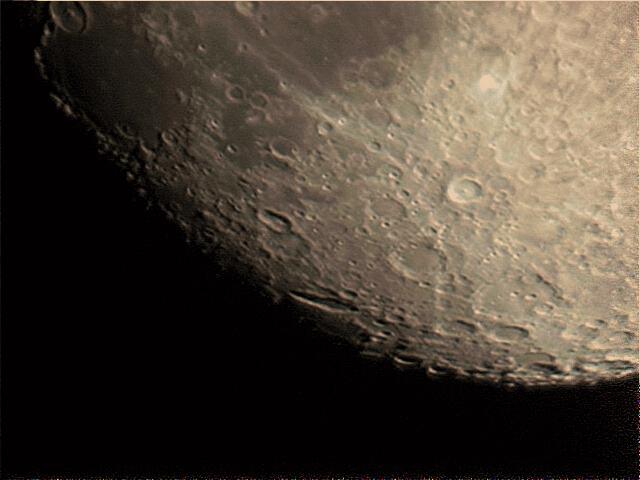
Subject: Jupiter image from 06/18/10 with Meade ETX 125PE Sent: Wednesday, June 23, 2010 20:58:31 From: Robert Amdahl (rramdahl@yahoo.com) Here's an image that I took on 06/18/10 with a Meade ETX 125PE, a Meade LPI and no Barlow. It is another image of Jupiter showing the GRS and the faded SEB. I like these images better than some of the other ones that I have taken recently because I think that I may have figured out something that I was doing wrong. Previously, I had the gain and offset set too high and the exposure times too short. The LPI just isn't sensitive enough to gather the information it needs that way and the pictures seemed to show it. For these sessions, I set both the gain and offset lower and increased the exposure time. It seemed to work better. I guess I learned that the LPI is like a webcam but not quite. But it does provide some tools that you can work with. Too bad they aren't sold anymore; I am learning quite a bit about the basics with mine. Also, this was taken before I dropped the LPI on the ground with a loud thunk. Hope you enjoy this image. Thanks, Bob
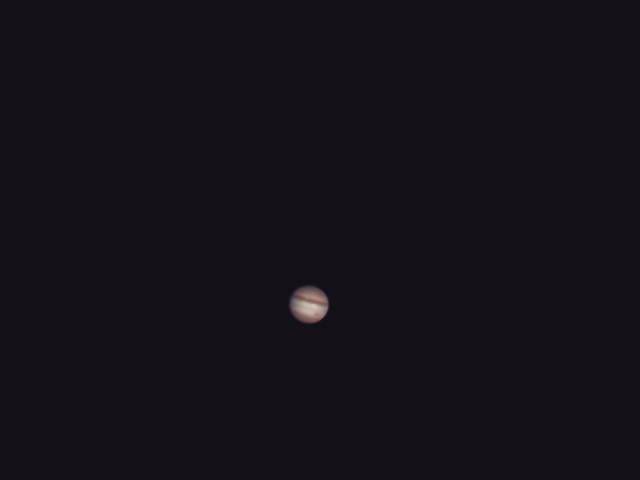
Here's another Jupiter from 06/18/10 with a Meade ETX 125PE, Meade LPI and a 2X Barlow. This was after the LPI had fallen to the ground so I think it may still be working. However, I wasn't sure if it would again. After it had fallen, it wasn't working right and I had to restart both the computer and the app a couple times. Between the problems that I had with my hand controller and this, I need to change my setup procedures. Otherwise I'm afraid it could start costing money. Again, I had the gain and offset set lower and the exposure time increased and I am more pleased with these images. I still have a lot of things to learn and practice (esp., focusing) but I thought I made some progress. Hope you also enjoy this image and I apologize if I get too wordy but I hope that somebody else just starting out may learn something. I know that I have from folks who have posted on your site. That is why it is the best. But if I am too wordy, please let me know and I will tone it down. Thanks again, Bob
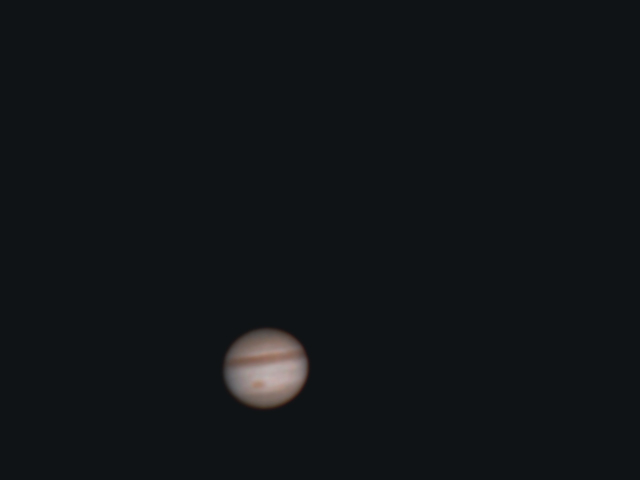
Subject: Lpi pics of the Moon Sent: Thursday, June 17, 2010 04:43:08 From: Bob Keats (bob.keats@btinternet.com) Thought you might like to see some of the pictures I have taken of the Moon with a Meade NGC60 and LPI camera.I am going to try for some more with my ETX 125 now I have the hang of things. Cheers Bob
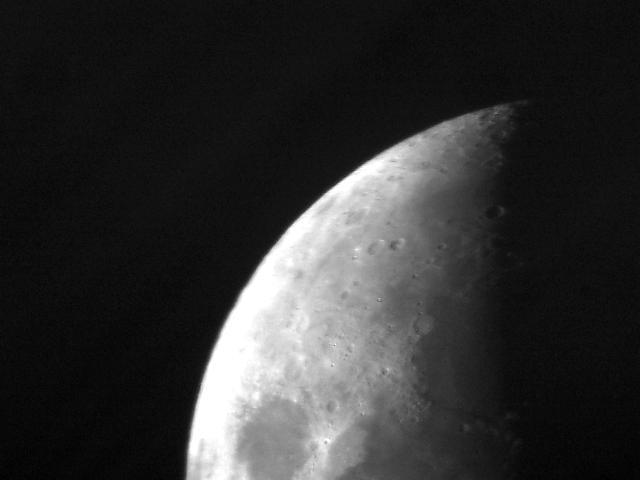
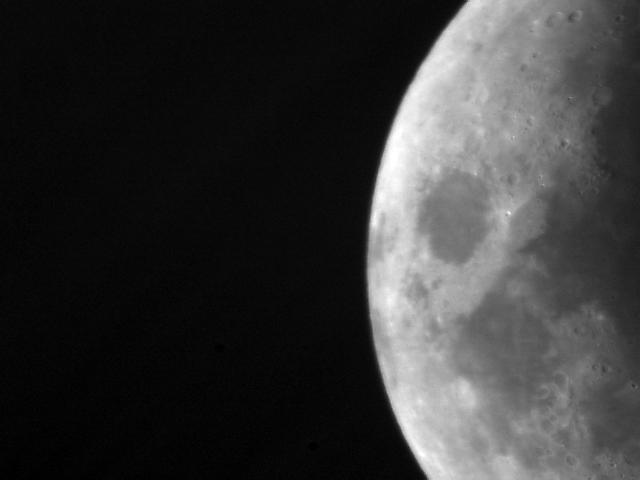
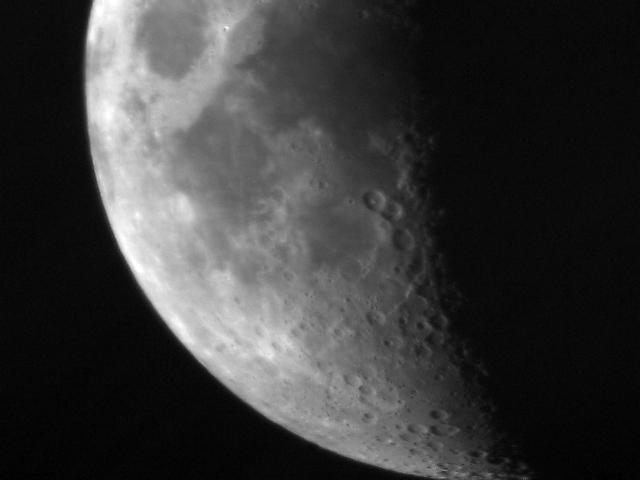
Subject: Moon ETX LPI 2010MAR23 Sent: Wednesday, March 24, 2010 17:46:31 From: Nohr Tillman (ntillm01@yahoo.com) Got this last night through the little ETX-90 in polar axis mode with Autostar running the sidereal rate. Was about 22:30 EDT so the moon was very high and near transit, plus or minus. Let the LPI and Envisage take a bunch of raws, then combine into a jpeg later. Honest this is only about ten combined raws with no filter...combining took the shimmer out of an otherwise unstable sky at about 55 deg F. ETX-90 LPI 2X barlow Enjoy, Nohr Tillman Troy, MI, USA, Earth
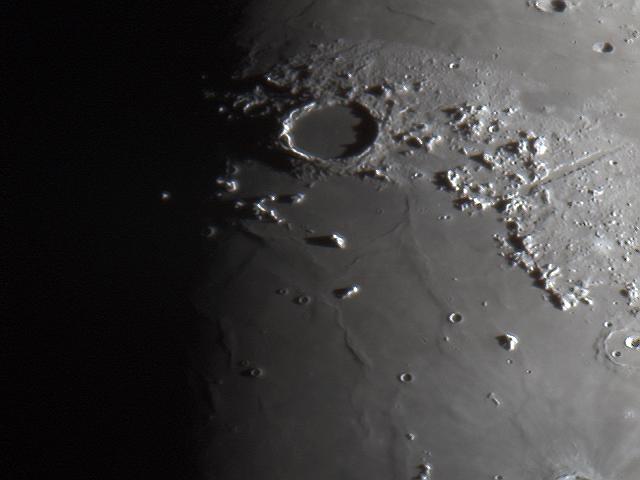
Subject: 2010MAR18 Mars - 1 Sent: Tuesday, March 23, 2010 06:53:46 From: Nohr Tillman (ntillm01@yahoo.com) Did a little more playing around with Mars and Envisage to see what I could get. It's taken me three years with this equipment to figure out how to image, and image process, but worth the wait, I think. I set up the ETX-90 and LPI and tinkered with it for around an hour. By then the whole rig was tracking stable and the focus stayed put with everything at ambient temperature of 55deg F. I used the "centering box" in Envisage and let it take several raw images at 50% or better. I didn't combine them live, but did the stacking the next morning using the "centering box" again on the raws. First image is a composite of 15-20 raws that Envisage stacked in post-processing with the hard-edge kernal filter. Second image is the same series of raws combined with edges-only kernal filter...it brings out the ice cap.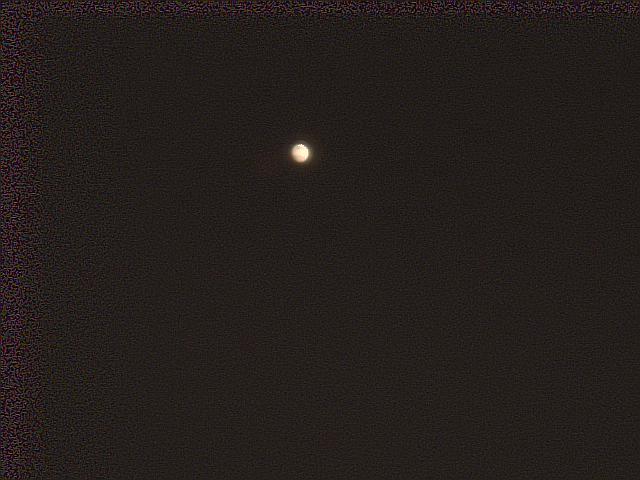
Continuing...similar images using the same technique. Raws were taken on the same night as the prior set, and combined the next morning. This was another combined series showing some red shades and the ice cap. I'm starting to believe this is actual detail that I'm pulling down with the ETX-90, LPI, 2X barlow and the Meade Envisage software. I also flipped these horizontally to correct for the Mak mirror inversion. Mars Today http://www-mgcm.arc.nasa.gov/ confirmed that the northern ice cap is tipped toward us slightly right now. First image, post-process of around 20 raw files using hard edge kernal filter. Second image, post process of same series of raws using edges-only filter.
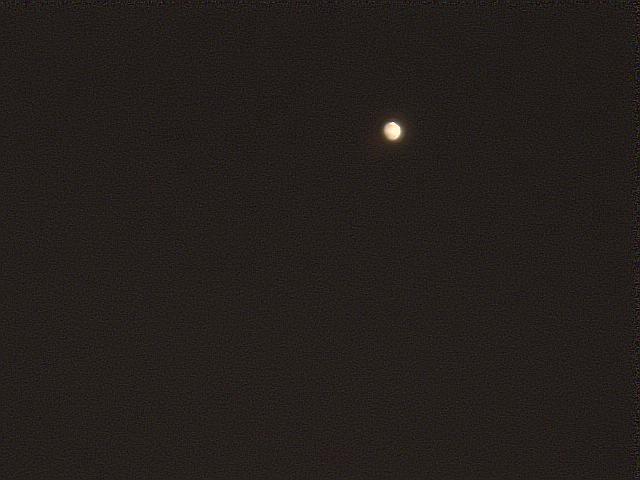
Nohr Tillman Troy, MI, USA, Earth
Subject: Replacement for Lpi follow-up Sent: Sunday, February 21, 2010 17:35:04 From: George Messmer (gejmessmer@comcast.net) Thanks for the suggestions on the LPI and DSI. When I began having trouble getting the Autostar/Lpi working, I called Meade and they were not able to resolve my problem. The person I talked to mailed me a Disk of the original version of Autostar that was issued when the LPI came out. I now have " a back to the basics" situation. My intention is to use the ETX90PE with the LPI strictly as a Solar system scope and camera. As I learn more and become more proficient in Astronomy, I will move up a notch. Thanks again for your input, and for the many assists your web site has given to me over the past 2 years or so. Hope you have fully recovered from your flu episode. George Messmer Port St Lucie, FlMike here: Thanks for the update. Keep me posted on your LPI efforts. And thanks for the well-wishes. Fully recovered and back to observing from Cassiopeia Observatory.
Subject: Replacement for LPI imager Sent: Wednesday, February 10, 2010 18:06:36 From: George (gejm@comcast.net) I have an ETX 90 Premiere with the LPI imager. Due a hiatus from Astronomy, I am just getting around to trying the LPI. From what I have read, the LPI doesn't seem to get along to well with windows, and Meade no longer supports it. Is the DSI a viable option for the ETX90 or should I be looking for an imager more matched to the 90. Thanks for the help George MessmerMike here: There are some tips on the Helpful Information: Astrophotography page that may help you get the AutoStar Suite and the LPI working with more recent versions of Windows. Yes, the DSI will work fine with the ETX-90 but remember, you are still using Meade's AutoStar Suite software. Alternatively, you can use some types of webcams and various applications for imaging with a webcam.
Subject: Re: How can I get the LPi to work with windows7? Sent: Thursday, January 21, 2010 13:16:47 From: Stephen Bird (stephen.bird@btconnect.com) The issue of the LPI with Windows Vista and now Windows 7 has been around the block a few times. In short Meade has not made and does not intend ever making drivers for the LPI to work with Windows 7 or Windows Vista. There have been people who claim to have got the LPI to load on Vista by allowing Windows to load the equivalent Trust 14823 webcam driver which matches the CMOS chip spec used in the LPI. However the instant you do this you lose the long exposure capability and it means the camera is virtually useless for anything other than terrestrial work or the Moon if you are lucky. Basically the Trust 14823 driver makes the LPI into an ordinary webcam of the same quality as you get from K-Mart for 10 bucks! For Windows Vista and Windows 7 64 bit, forget it, unless the hardware supplier says they have 64 bit drivers, it is highly unlikely to work, same for much of the software. However a little light at the end of the tunnel for Windows 7 Premium and better users, there is apparently a feature that can emulate Windows XP working so this might work with 32 bit versions. This is only for 32 bit of course, 64 bit can't emulate 32 bit I understand. I gave up on my LPI and ebay'ed it and use a long exposure modified webcam and my DSI. So not great news and maybe why Meade give the LPI free with some of their telescopes, probably have a warehouse full to get rid of! Regards Stephen Bird
Subject: Re: How can I get the LPi to work with windows7? Sent: Friday, January 15, 2010 06:55:57 From: Bob Keats (bob.keats@btinternet.com) Firstly I'd like to say you have a really great site,very useful. As for my problems ,it does not look good.Firstly I forgot to say the version of Windows 7 I have is 64 bit so that creates its own problems as the software for the lpi is I think 32 bit,also my version is the "Home" edition.I looked at some of the advice on your site and found from "Ray Tomlinson" a piece about his problems with a similar setup.I read his very comprehensive guide and the upshot is I would need to upgrade my version of Windows7 and then buy a copy of Windows XP before I could attempt to get things working.As I still have my old Laptop running XP I think I will continue with that until such time as a driver is created for Windows7. I tried installing the Autostar suite v5.5 to see if it had any drivers but they are not there in that version. Thanks for all your help,I shall certainly be keeping an eye on your brilliant website Cheers Bob
Subject: How can I get the LPi to work with windows7? Sent: Monday, January 11, 2010 05:32:34 From: Bob Keats (bob.keats@btinternet.com) I don't know if you can help but I have recently bought a new laptop with windows7 on and I would like to use the LPi camera I have with it but when I load the Autostar software it cannot find the camera and attempts to find a compatable driver for the lpi fail. Thanks BobMike here: Have you installed version 5.5 of the AutoStar Suite? I don't know if it has a Windows 7 driver (since I don't use Windows) but it is the latest version. If that doesn't help, see the article "LPI and Microsoft Vista" on the Helpful Information: Astrophotography page. Perhaps the tips there will help with Windows 7.
And:
Thank you for the prompt reply,I'll try and let you know. Cheers Bob
Go to the 2009 LPI Page.
Go to the 2008 LPI Page.
Go to the September-November 2007 LPI Page.
Go to the April-August 2007 LPI Page.
Go to the January-March 2007 LPI Page.
Go to the July-November 2006 LPI Page.
Go to the May-June 2006 LPI Page.
Go to the March-April 2006 LPI Page.
Go to the January-February 2006 LPI Page.
Go to the October-December 2005 LPI Page.
Go to the July-September 2005 LPI Page.
Go to the May-June 2005 LPI Page.
Go to the March-April 2005 LPI Page.
Go to the January-February 2005 LPI Page.
Go to the October-December 2004 LPI Page.
Go to the July-September 2004 LPI Page.
Go to the April-June 2004 LPI Page.
Go to the January-March 2004 LPI Page.
Go to the 2003 LPI Page.
Go back to the Astrophotography Page.
Go back to my ETX Home Page.